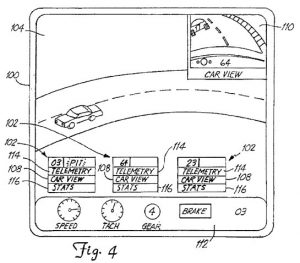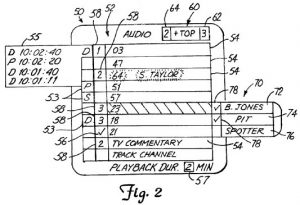On February 17th, a judge in the U.S. District Court for the Northern District of Georgia (N.D. Ga.) granted a motion to dismiss a case for failure to state a claim after invalidating two patents under the patentability standards set by the U.S. Supreme Court in Alice Corp. v. CLS Bank International. The order ends the district court component of this lawsuit filed by Minnesota-based TAGI Ventures, LLC against Georgia-based media company Turner Sports Interactive, Inc. in which TAGI alleged that Turner Sports infringed on patents covering remote access to in-car camera views during a car race. The case may now move on to the Federal Circuit if the patent owner wishes to appeal the ruling, which would seem likely.
In its original complaint filed in the U.S. District Court for the District of Minnesota (D. Minn.), TAGI asserted two patents:
 U.S. Patent No. 7162532, titled System and Method for Listening to Teams in a Race Event. It claimed a computer-implemented method to allow a remote computer user to listen to teams in a race event which involves receiving audio signals from a plurality of audio sources, transmitting information from at least some of the audio signals to a remote computer, assigning priority levels to audio sources from the race event based on a remote computer user’s indications and playing the audio signals from the race event on the remote computer.
U.S. Patent No. 7162532, titled System and Method for Listening to Teams in a Race Event. It claimed a computer-implemented method to allow a remote computer user to listen to teams in a race event which involves receiving audio signals from a plurality of audio sources, transmitting information from at least some of the audio signals to a remote computer, assigning priority levels to audio sources from the race event based on a remote computer user’s indications and playing the audio signals from the race event on the remote computer.- U.S. Patent No. 9059089, same title as the ‘532 patent. It protected a similar computer-implemented method which gives users who are remotely watching a racing event a way to listen to communications between a driver and the driver’s pit crew.
 TAGI’s allegations of patent infringement focused mainly on Turner Sports’ RaceBuddy software products which provide Internet users access to in-car and stationary cameras, near real-time statistics and various audio sources. These infringing products were primarily used in conjunction with live television broadcasts of races sanctioned by NASCAR. Between 2010 and 2015, RaceBuddy offered users a mosaic camera view allowing them to select an audio source from the race. TAGI also alleged that, around 2011, Turner entered into an agreement with NASCAR and ESPN to provide these allegedly infringing products for free.
TAGI’s allegations of patent infringement focused mainly on Turner Sports’ RaceBuddy software products which provide Internet users access to in-car and stationary cameras, near real-time statistics and various audio sources. These infringing products were primarily used in conjunction with live television broadcasts of races sanctioned by NASCAR. Between 2010 and 2015, RaceBuddy offered users a mosaic camera view allowing them to select an audio source from the race. TAGI also alleged that, around 2011, Turner entered into an agreement with NASCAR and ESPN to provide these allegedly infringing products for free.
RaceBuddy has been a valuable part of Turner Sports’ strategy to encourage greater viewership of NASCAR races through Internet channels. In June 2011, RaceBuddy set a single-day record with 1.1 million streams during the NASCAR Sprint Series Cup Race at Pocono Speedway, beating RaceBuddy’s previous record of 712,000 streams during the previous year’s Sprint Cup Race at Pocono. By the end of 2011, the first year that RaceBuddy streaming was extended into NASCAR’s postseason, a total of 4.6 million streams of NASCAR races had been accessed through the RaceBuddy service.
The motion to dismiss filed by Turner Sports, and granted by the N.D. Ga. district judge, argued that both of TAGI’s patents are directed at unpatentable subject matter under 35 U.S.C. Section 101. In response, the court applied the now familiar two-step standard Alice/Mayo test for distinguishing patents claiming abstract ideas and laws of nature.
In the first step, the court considered whether the claims were directed at an abstract idea. Turner Sports argued that the processes in both the ‘532 and ‘089 patents were unpatentable as they were nothing more than claims for more widely broadcasting what was available locally. TAGI’s responded by arguing that its patents were directed at improvements in computer functionality, specifically the new functionality of a server providing a solution to the problem of remote access of audio broadcasts of a race event, relying heavily on legal precedents set by this May’s decision by the U.S. Court of Appeals for the Federal Circuit (Fed. Cir.) in Enfish, LLC v. Microsoft Corporation et. al. The court, however, decided that TAGI’s patents failed step one of the Alice test as “the patents here propose no such improvement in computer functionality.”
In step two of the test, the court decided that the patents did not contain an inventive concept. “Providing video data, no matter from how many cameras, is an abstract idea, and the patents disclose nothing about the claimed process that would constitute an inventive step,” the court order reads. At the core of the decision the court found that the patents-in-suit “constitute just the kind of patent-ineligible subject matter contemplated in Alice.”

![[IPWatchdog Logo]](https://ipwatchdog.com/wp-content/themes/IPWatchdog%20-%202023/assets/images/temp/logo-small@2x.png)


![[Advertisement]](https://ipwatchdog.com/wp-content/uploads/2024/04/Patent-Litigation-Masters-2024-sidebar-early-bird-ends-Apr-21-last-chance-700x500-1.jpg)

![[Advertisement]](https://ipwatchdog.com/wp-content/uploads/2021/12/WEBINAR-336-x-280-px.png)
![[Advertisement]](https://ipwatchdog.com/wp-content/uploads/2021/12/2021-Patent-Practice-on-Demand-recorded-Feb-2021-336-x-280.jpg)
![[Advertisement]](https://ipwatchdog.com/wp-content/uploads/2021/12/Ad-4-The-Invent-Patent-System™.png)







Join the Discussion
18 comments so far.
Caesar Salazar
February 28, 2017 01:26 pmEric,
I have done nothing but truth-seeking. When my words came across as brash I apologized and reiterated that I was merely interested in seeking knowledge so that a reasonable inference could be made from the available information. Your call to “ban” me is quite repressive in an open and honest conversation regarding the state of the law in this field. Such rhetoric seeks only to divide reasonable people from honest discussion.
jbavis
February 28, 2017 11:50 amIt seems the recent pattern has played out again – small inventor property rights are trampled upon by larger entity thanks to recent changes in the U.S. patent system.
One of 2 things: either don’t issue the patent in the first place and fool the patent owner into thing he/she has a property right, or substantially cut back on things like Alice.
Eric Berend
February 28, 2017 06:54 amI for one, have had more than enough of “Caesar Salazar” ‘s vituperative nonsense. He talks a good game, is obviously legally fluent; yet, ALWAYS takes the anti-inventor, pro-infringer side. Every. Single. Time.
And now, this: implications of disparagement about Steve Brachmann, where he/she has the temerity to engage you in such provocative nitpicking; then, coyly backing off?
Please, Gene: ban this “true” ‘troll’, as soon as it can be reasonable. Thank you for considering my request.
Caesar Salazar
February 27, 2017 10:19 pmGene,
So is it correct to say that in this particular case the claims at issue were invalidated? On a simple motion to dismiss as opposed to later in the proceeding? It just surprises me because I have never really heard of such things happening.
Gene Quinn
February 27, 2017 10:07 pmCaesar-
You seem new to the Alice/Mayo game (and it really is a game). You are right to say that patents are ordinarily invalidated claim by claim by a district court or in the PTAB as the result of application of prior art. In the district court this is done well down the road after claims have been construed, discovery held and prior art applied to the construed claim terms. Thanks to the Supreme Court’s Alice/Mayo 101 jurisprudence patent claims are being invalidated under 101 without the presumption of validity (despite the statute that says issued patents are presumed valid), without discovery, without claim construction being done and on a motion to dismiss. So these claims have been lost.
Technically patents are not invalidated, patent claims are invalidated, but for sake of titles and limited space we sometimes make that type of short hand statement.
Caesar Salazar
February 27, 2017 07:02 pmSteve,
Ok so from briefly skimming the order to dismiss, the court found that the plaintiff failed to state a claim for infringement because, in essence, there was nothing to be infringed. It said this because it thought that the patent didn’t pass the two-step Alice test.
Now the question is: is this an affirmative invalidation of a patent? Or is it simply a motion to dismiss that was granted? What happens to the patent now?
Thus the real question is, did the court really invalidate the patent? If it didn’t, then perhaps a correction to the article title should be made.
Caesar Salazar
February 27, 2017 06:55 pmSteve,
I forgot to add. Thank you for the link and I apologize if my request came across as brash. Apologies to you to Gene.
Caesar Salazar
February 27, 2017 06:53 pmSteve,
I want to know what the court said with regard to the validity of the patent. Was it simply a motion to dismiss for failure to state a complaint? Or did this motion to dismiss also legally invalidate a patent? Usually patents are invalidated at a trial or PTAB proceeding. I’m curious as to what this court’s dismissal actually means? Does it means that the patent becomes vapor? Or does it mean that this particular case was dismissed?
Steve Brachmann
February 27, 2017 06:45 pmLink to court order added to first paragraph. Out of sheer curiosity, Caesar, what is your interest in our blog? Are you a stakeholder in some part of the patent system?
Gene Quinn
February 27, 2017 06:35 pmCaesar-
Now I know you are just playing with me.
You actually think that tech journalist provide links to authoritative documents they use when they write? Really? What are you reading? In fact, tech journalists reporting in this area don’t even cite patent numbers, or tell you which court cases are filed in, or who the judges are, or what the docket number is so you can follow the case if you like or look things up. Steve cites and cites and cites in his articles. As a rule we always provide the decision, complaint, brief, whatever. In this one case the actual document was not provided, but the date of the decision is there, as is the court, as is the name of the parties. If you want to find the document you can. So who exactly are you trying to fool? Because you aren’t going to fool me, you aren’t going to fool Steve, and you aren’t going to fool any of our readers.
Caesar Salazar
February 27, 2017 06:30 pmGene,
I did notice that he was a tech journalist, which makes it even stranger that there was no reference to the main document at issue in this article.
Gene Quinn
February 27, 2017 06:08 pmCaesar-
Funny that you researched him enough to find his LinkedIn page but not enough to notice he is a tech journalist with over a decade of experience. So I’ll leave it at that.
-Gene
Caesar Salazar
February 27, 2017 06:01 pmGene,
I was not attacking Steve, I was merely questioning why there was no direct link or citation to the central document at issue in this article. If Steve were a trained attorney, I could take his word for it, but since he isn’t I was compelled to question his authority on the matter. In fact for someone who has written so many articles I would expect him to provide a source. The fact that he didn’t puzzled me. He explained in the comments that he was not able to provide a direct link and I thanked him for it. I don’t see why you are so mad.
Second, I was not attacking him for having a BA in fine arts. I was merely pointing out his qualifications to substantiate my point above. You brought in the “performing on stage” so I’ll leave it at that.
Gene Quinn
February 27, 2017 05:55 pmCaesar @2-
I see you looked in Steve’s resume. Did you also notice that he has authored or co-authored over 770 articles here on IPWatchdog.com over the past 4+ years? Did you notice that Steve was a tech journalist with author credit in several major publications before we hired him at IPWatchdog.com?
You are stepping into something here that is increasingly a sore spot, and right after on another thread you said your comments are always substantive and never attacking. Really?
Now several things specifically. First, I’m done tolerating anyone bitching and moaning that in his spare time Steve enjoys performing on stage. If the fact that Steve is a well rounded human being and performing artist bothers you that is your problem, not mine, not Steve’s. Second, everything published on IPWatchdog.com is reviewed and edited. Steve and I work closely together. Steve has latitude to pick his own topics and he writes many articles I suggest/assign. I find it funny that the ones people always push him on are the ones I’ve specifically assigned him to write, and the one’s that I have personally edited for accuracy.
Steve is an asset and if you don’t like his writing the simple solution is not to read his articles. I would have thought someone of your obvious high intelligence level could have figured that out without the suggestion.
-Gene
Caesar Salazar
February 27, 2017 02:02 pmSteve,
Thank you for responding to my concerns. I really appreciate it.
Steve Brachmann
February 27, 2017 11:47 am@Caesar – It is regrettable that the link I had for the information wasn’t something I could share through this article with a hyperlink. I may be able to upload a PDF, and I will look into doing that today. In any event, you could e-mail me directly and I will do what I can to get the relevant materials to you. Anything sent to [email protected] will reach me.
Also, thanks for checking out my LinkedIn profile. And I can assure you that a person can be both a journalist with a high degree of integrity in reporting the facts, as well as a fine stage actor. And if you ever make it out to Buffalo, NY, I would be honored to show you that this is the case.
Caesar Salazar
February 27, 2017 08:13 amThis article doesn’t provide a link to the actual court order that it speaks about throughout. There is a link to the complaint, but not the order allegedly “invalidating” the patents. Furthermore, this is the complaint filed in the Minnesota district court. Yet the order comes from the Georgia district court.
Were the patents really invalidated? Or was the complaint just dismissed for failure to state a claim? Would dismissal of a suit “invalidate” the patents legally? Or is the party free to amend the complaint?
Without the actual opinion link, how are we as readers supposed to check that what is written is valid reporting? According to Mr. Brachmann’s LinkedIn page, he has a BA in “Fine Arts (BFA), Acting, Communication.” That is all well and good, but how can I take his word for reporting on a legal issue when he doesn’t provide citations?
I’m worth a million comprises
February 27, 2017 06:28 amThough these patents do not really address an “abstract idea”, you have to admit that they are weak and include no technological advancement.